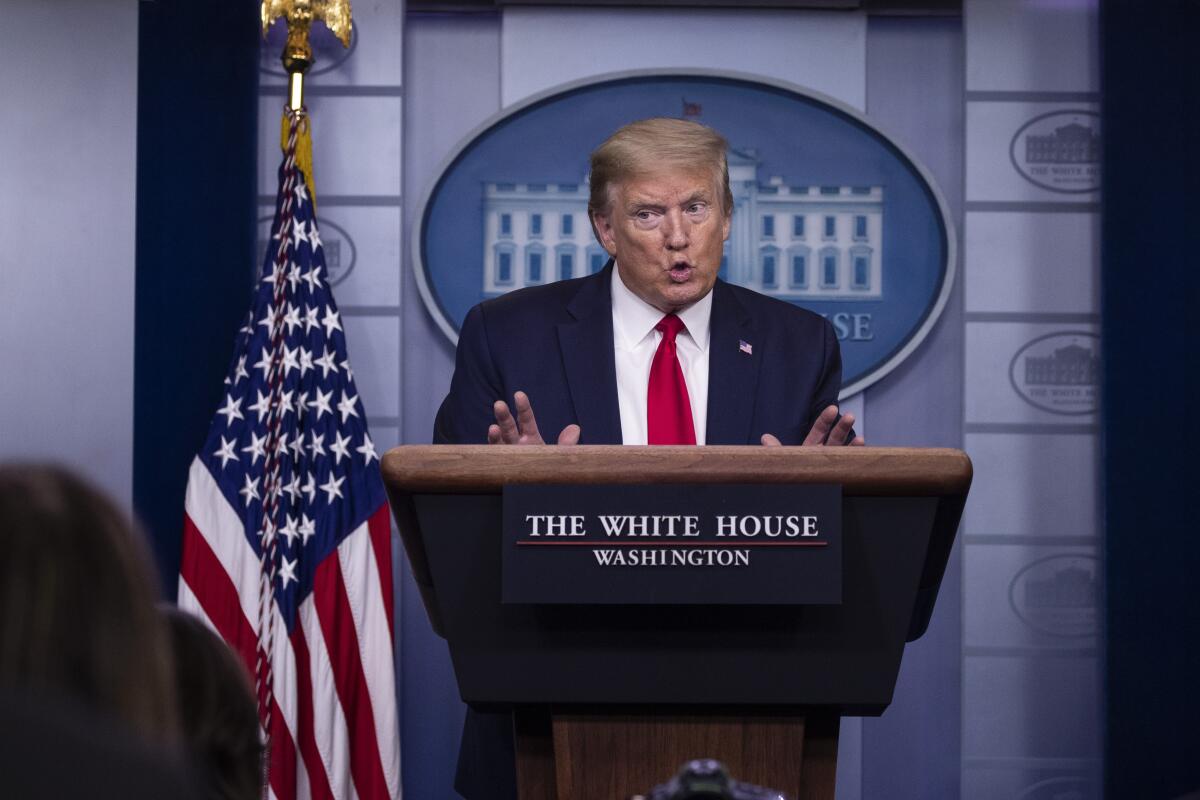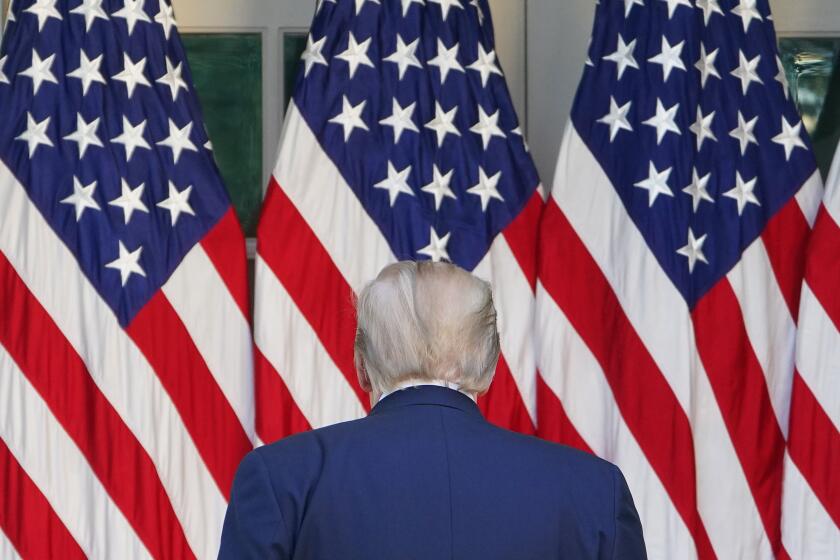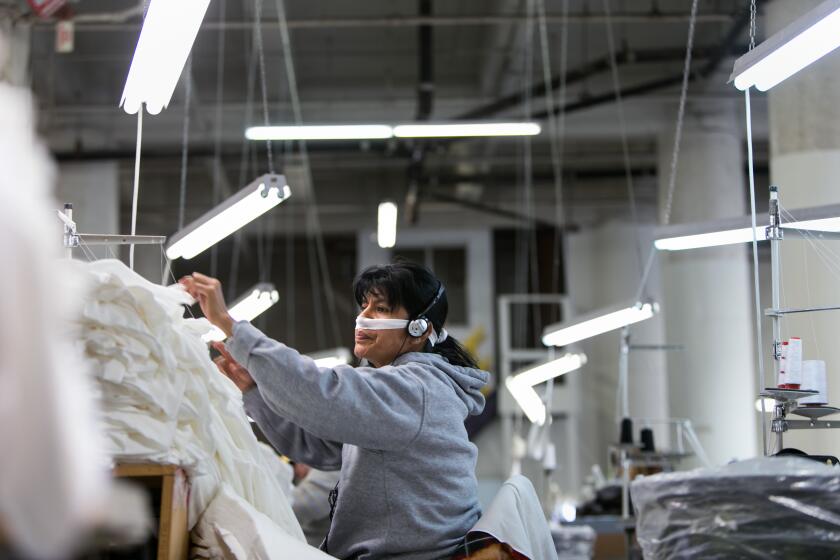Trump uses coronavirus crisis to push other policy priorities

- Share via
WASHINGTON — Even as the coronavirus crisis has brought most of the country to a screeching halt, President Trump has begun to turbocharge his administration’s efforts to slash business and other regulations, and to pursue other long-held policy goals, with consequences that are likely to outlive the pandemic.
Labor groups, environmentalists, immigration activists and other critics say the White House is cynically using the nation’s medical emergency and economic devastation as political cover to undermine or overturn rules put in place long ago to protect the public.
“When you weaken a rule, it’s very difficult to get it reinstated,” said Dennis Kelleher, president of the consumer advocacy group Better Markets. Federal regulators, he said, “are bending over backwards” for industry groups.
As deaths soared and the economy fell off a cliff, Trump careened through a critical week in the coronavirus crisis, offering conflicting advice and contradictory messages before punting on what he called ‘the biggest decision I’ve ever had to make.’
In the most dramatic example, Trump this week vowed a blanket ban on immigration. He later signed a proclamation to restrict some people seeking green cards from entering the country for at least 60 days, a less draconian measure but one that escalated his hard-line efforts to curb even legal immigration.
Asked if he was using the coronavirus to further his political goals, Trump portrayed immigration as a threat to U.S. workers, a contention most economists reject.
“I want our citizens to get jobs,” he said. “I don’t want them to have competition.”
The Environmental Protection Agency has stopped enforcing some rules on air pollution and water quality during the crisis, moves that fit the administration’s efforts since Trump took office to relax regulatory enforcement.
The EPA said the coronavirus shutdown was affecting government laboratories where samples are analyzed, impairing its ability to determine whether companies are violating pollution rules. The agency asked industry to “act responsibly under the circumstances in order to minimize the effects and duration of any noncompliance caused by COVID-19.”
Similarly, the Labor Department’s Occupational Safety and Health Administration has curbed workplace inspections even though the coronavirus has increased concerns about safety on the job. OSHA said its goal was to “protect workers while also taking appropriate diligence to protect our own personnel.”
Labor unions have expressed alarm because OSHA already had fewer inspectors making the rounds than in decades.
“They’re not enforcing safety protections across the board,” said Rebecca Reindel, safety and health director for the AFL-CIO, the country’s largest federation of labor unions. “The people who are working right now don’t have what they need to be safe.”
Factories in Downtown L.A.’s garment district are switching over to mask production, while paying workers the same illegally low wages as always.
The Federal Reserve has started allowing large banks to keep less cash on hand to cover potential losses, overriding a rule created after the financial crisis in 2007-08 sparked the Great Recession. Trump has broadly opposed strict rules on the financial industry.
In another move, the Treasury Department is considering imposing tough terms on an emergency $10-billion loan to the troubled U.S. Postal Service, another longtime Trump target, the Washington Post reported Thursday.
Trump has berated the Postal Service for years, claiming it is exploited by Amazon and other e-commerce sites, and has sought to change how much it charges to deliver packages.
Conservative advocates and corporate lobbyists are dusting off wish lists for loosening other rules, and the White House Office of Information and Regulatory Affairs, which reviews federal rules, has been churning through the possibilities.
“OIRA is working overtime. The White House counsel’s office is working overtime,” said Paul Winfree, a former White House official who now works at the Heritage Foundation, a conservative think tank that has compiled its own list of recommendations.
The group wants to pause enforcement of regulations on small businesses during the crisis, although it doesn’t say which ones. Winfree said the White House has already been adept at slashing regulations, and now is the time to push forward.
“They already have that process in place,” he said. “What our suggestion is — juice it up and take advantage of it.”
The administration’s approach is hardly new to American politics.
“You never want a serious crisis to go to waste,” Rahm Emanuel, President Obama’s first chief of staff, quipped after the 2008 election. “And what I mean by that is an opportunity to do things that you think you could not do before.”
In addition to easing regulations, the coronavirus crisis may allow Trump to achieve other goals he has sought for years.
He’s pushing again for massive investment in roads, bridges and other public infrastructure, a 2016 campaign promise that he has yet to deliver. The idea has gained bipartisan traction as lawmakers look to get Americans back to work, although Senate Republicans are not yet on board.
Trump took office pledging to cut regulations, and early in his presidency said he would require that two rules be eliminated for every one added. He stocked his White House with aides who view the regulatory state with disdain.
“The people around him are very thoughtful economists with a well-worked-out deregulatory agenda,” said John Cochrane, an economist at Stanford University’s Hoover Institution, a conservative think tank. “Trump himself doesn’t stay up at night thinking section 236-B-slash-2 could use a better enforcement mechanism.”
Trump’s critics say the changes could be fast-tracked with little transparency. In some cases, public comment periods were extended by a few days, although many Americans and public interest groups are facing stresses that limit their ability to meet deadlines to express their opposition.
Amit Narang, the regulatory policy advocate for Public Citizen, a left-leaning consumer rights group, noted that the EPA, in allowing companies to avoid clean-water and emissions rules, is not requiring them to publicly disclose which rules they are skipping.
“They should be at least making clear to the public that this nonenforcement policy is not resulting in harmful pollution,” he said.
Narang said some narrow rule changes — like allowing doctors to treat patients by phone or video — make sense during the pandemic.
But he said Heritage and other groups with ties to the administration are using the economic collapse to lobby for broader changes like pausing small-business regulations or curbing the ability to sue reopened businesses if their workers or customers get infected.
“They are absolutely trying to take advantage of this crisis to try to push forward partisan ideological agenda items that they wanted to accomplish before the crisis,” Narang said. “They want to convince the public that regulation is making the pandemic worse, but that is just flat-out not true.”
Celine McNicholas, director of government affairs at the Economic Policy Institute, a nonpartisan think tank, said the administration’s priorities are also evidence of regulations they’re not pursuing.
For example, the Centers for Disease Control and Prevention has recommended wearing masks and maintaining distance from other people, but OSHA hasn’t turned those guidelines into rules for the workplace.
“The failure to act at this moment says every bit as much as what they’re doing,” she said.
More to Read
Get the L.A. Times Politics newsletter
Deeply reported insights into legislation, politics and policy from Sacramento, Washington and beyond. In your inbox twice per week.
You may occasionally receive promotional content from the Los Angeles Times.














